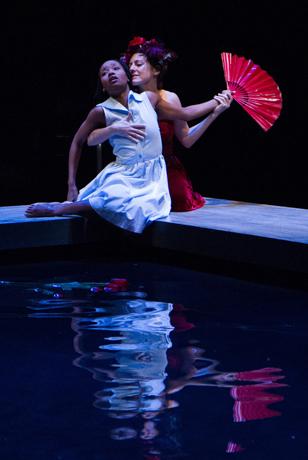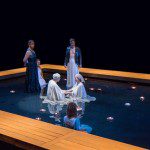“Metamorphoses”: Splashing Humor, Drama, Love Into Our Oldest Tales at Arena
By • August 15, 2013 0 1628

All things considered, it’s tempting to say that director-author-adapter — and, oh, just genial genius — Mary Zimmerman has the Midas Touch when it comes to bringing to the stage our dreams, our oldest stories, our gods, our myths, oldest jokes and sorrows.
Of course, after seeing “Metamorphoses,” Zimmerman’s astonishing and remarkably durable version of the 2,000-year-old “Metamorphoses” by the Roman poet Ovid (based on David Slavitt’s translation) at Arena Stage, set in a raging, slithering, slappy-sloppy giant water- and emotion-filled pool, you might not ever use that phrase again.
The tale of King Midas — and the tragic reality of having his wish fulfilled by a god — is one of the many myths and tales which spring to life in Zimmerman’s production. You could say it’s yet another of her collaborations with the authors—sometimes nameless, sometimes not—of our most essential beliefs, myths, legends and stories. Certainly, “Metamorphoses” is characteristic of her own touch and tools of the trade, she brings us to stories by which in the telling we are awed, shocked, moved, sometimes to tears, reconciled, filled here and there with laughter, both refined and coarse. She does it often with children’s toys, remnants of costumes, cloth, context and storytelling so old that it seems brand new, language that is at once just a step away from chants and intonation, and as vernacular as a an unfettered blogger.
We have seen Zimmerman in action before in Washington: “Argonautika,” “Candide” and at Arena the year before around this time with “Arabian Nights,” so full of magic, jokes and the sadness of a lost civilization.
We know the stories here, and almost immediately accept the setting, this giant pool of volatile, versatile, sweet birthing water, nearly a character in a play where characters splash with abandon. They roust and roil and disappear under the waves, come to grief and forbidden love, and are transformed, metamorphosed into forever. The pool, quite near front row audience members at the in-the-round Fichandler, is rarely still or peaceful. The result is that those audience members are offered towels but still are startled by splashing water — much like the action in this theater and play: you never know exactly what will happen next, where, when or how.
This is a play, first produced at Northwestern University, in which Zimmerman has invited here and there the Greco-Roman gods to mingle—why else is Zeus (aka Jupiter) referenced? Then again, you could say this is part of the theme here after all, which is one of transformation. That theme makes the play about life its own self: we recognize these sons and daughters of gods, but also merchants, fools, drunks, lovers, parents, louts and swains and sailors and actors as ourselves.
So, when in the thick of things, we meet Phaeton, he’s complaining to his shrink about his father, the sun god Apollo. Feeling guilty that his son has been bullied at school, Apollo asks him, “What do you want?” Phaeton smartly answers, “I want the keys to the car,” like any overconfident kid. But the car is the sun, of course, and Phaeton definitely isn’t ready to drive, burns the earth and falls to his death.
This is done with humor, as are the multiple disguises Vertumnus adopts to get the attention of the wood nymph Pomona, whom he loves but who ignores all his guises. It’s one of Zimmerman’s trademarks to get you to laugh at some basic level—there’s the “what’s-in-the-bag” playfulness and the wedding joke in “Arabian Nights.” But in the end, first and foremost, this production is about loss and transformation, about grief and how we manage to endure life and the burdens given to us by the gods.
All manner of stories will stick with you—I suspect it depends on state of mind and station. For me, the transformative tales haunt you into stillness. Thus, the powerful tale of King Ceyx, who is drowned on an ocean voyage his much beloved wife Alcyone begged him not to take. After ghostly visitations and an abundant display of grief and sorrow, the gods take pity and transform the couple into seabirds. (Alcyone’s father, the wind god Aeolus, calms the air and seashore so that she might nest with ease; hence our word, “halcyon.”) The familiar tale of Orpheus and Eurydice—told twice to include the German poet’s Rainer Maria Rilke’s version, who doubles down on the sadness—makes your hold your breath as Orpheus fails to retrieve his bride from the underworld by breaking the rule not to look back.
The most wrenching and shocking tale is that of Myrrha and her father, King Cinyras. Myrrha, a bounding teen uninterested in love and suitors, angers the goddess Aphrodite and is cursed to lust after her father. That lust and its consummation are depicted in a furious interaction in the pool, it’s looks physically dangerous and emotionally disastrous.
The production ends in a kind of vision, a hopeful dream of sheer beauty, light upon the water, a vision that opens up hearts to hope and makes souls transparent. We see them all then, a cast that is singularly and uniformly excellent, overcoming physical challenges—the water, the water, the air itself, the slippery path—to keep it real. I would single out Ashley Lathrop as Myrrha (and Midas’s daughter) who breaks your heart twice, Geoff Packart (he had the lead in “Candide” and “Liberty Jones”), an appealing and romantic heroic figure as King Ceyx, and Louise Lamson as Alcyone and Raymond Fox as Midas.
Because we have always told stories around campfires, in our hearths and homes, in liturgies and celebrations, between the covers of books and sacred texts, in ancient arenas, theater in its present and past forms has always seemed to be the place where we come to believe that what we see before us is both an artifice—artful and powerful—and a mirror through which we can fly, or in the case of this “Metamorphoses,” swim.
“Metamorphoses” runs at Arena Stage through March 17
- (L to R) Ashleigh Lathrop and Tempe Thomas in “Metamorphoses” at Arena Stage at the Mead Center for American Theater, Feb. 8 through March 17. | Teresa Wood
- John Rose / NPR






